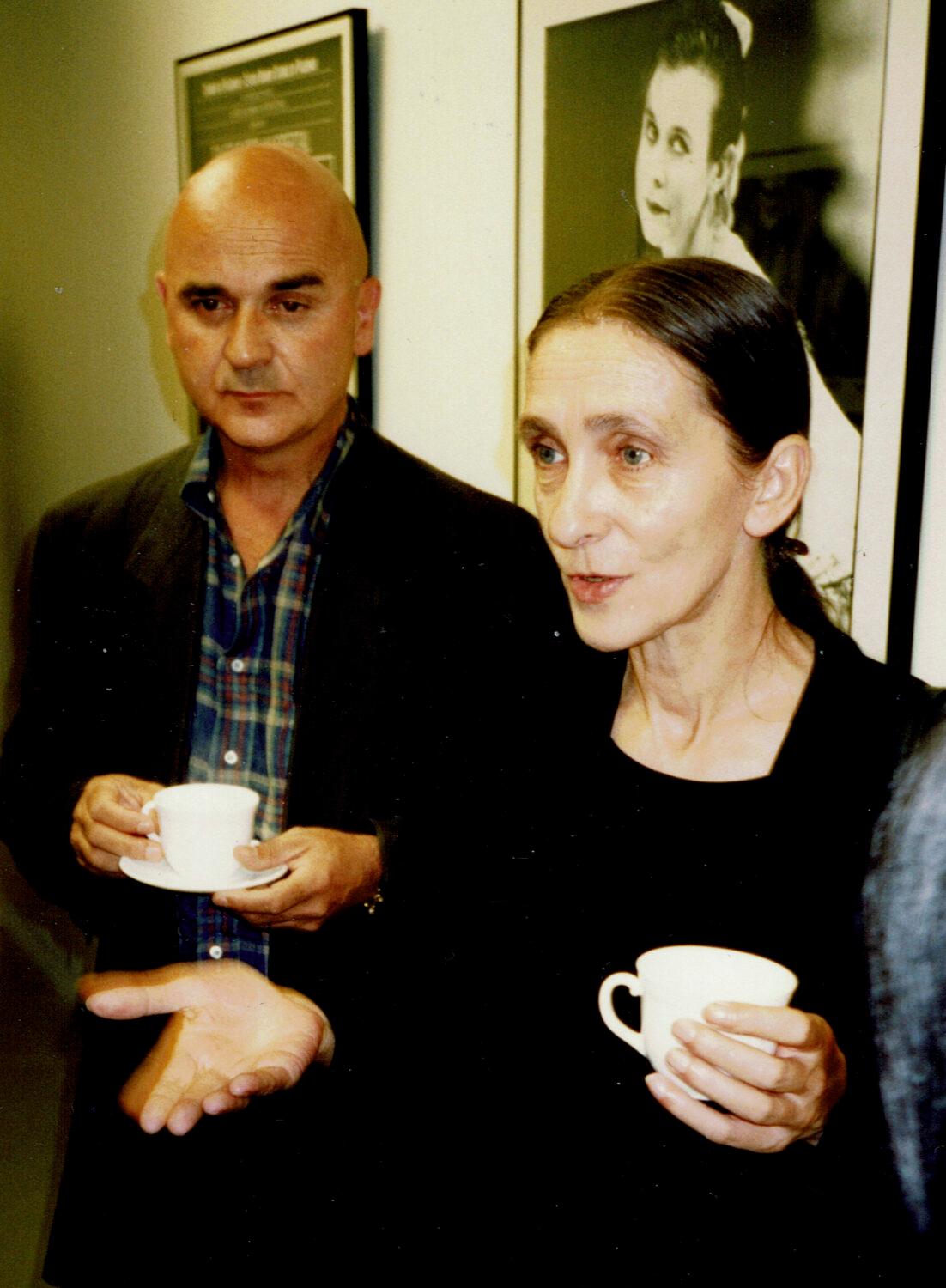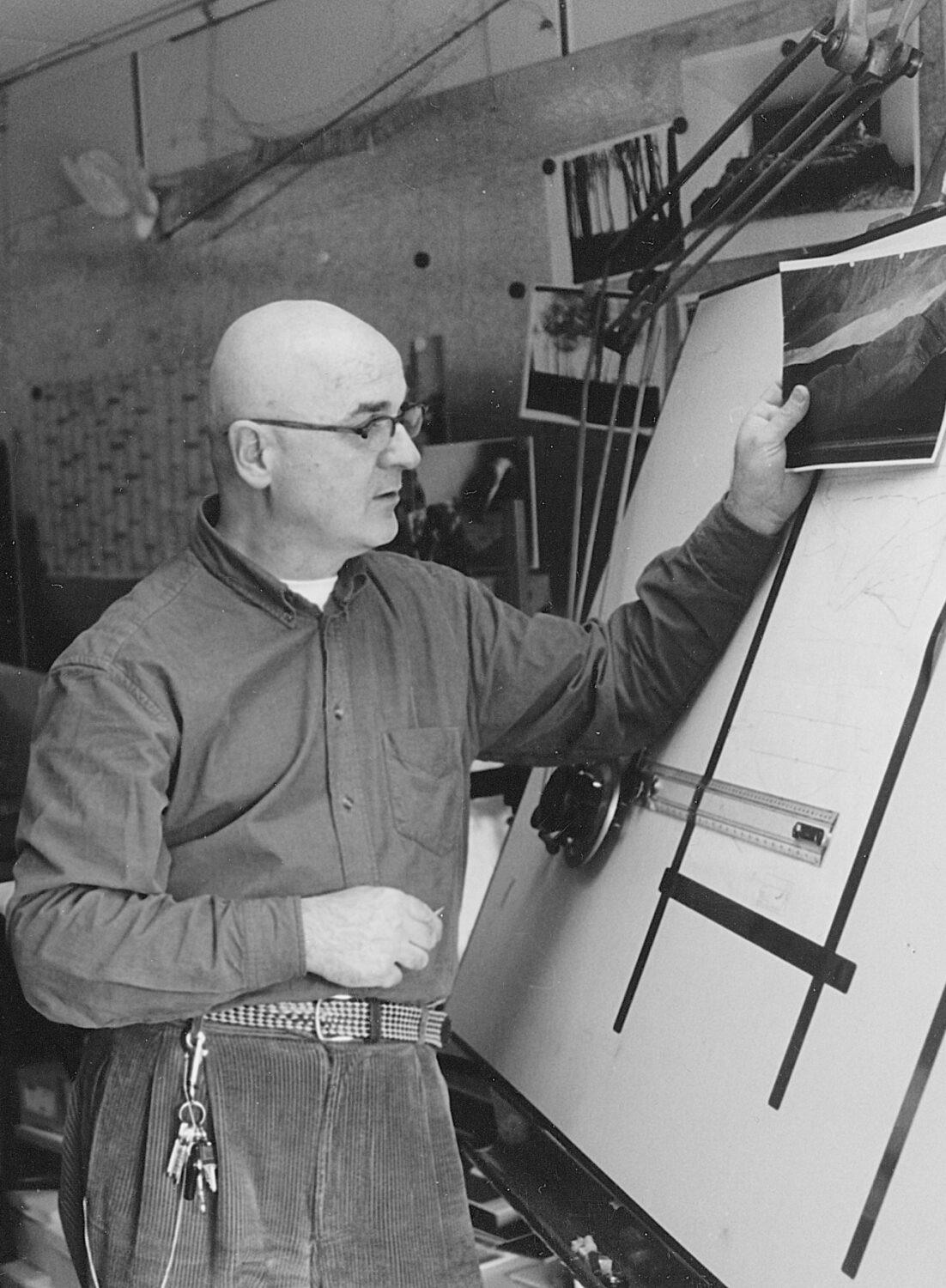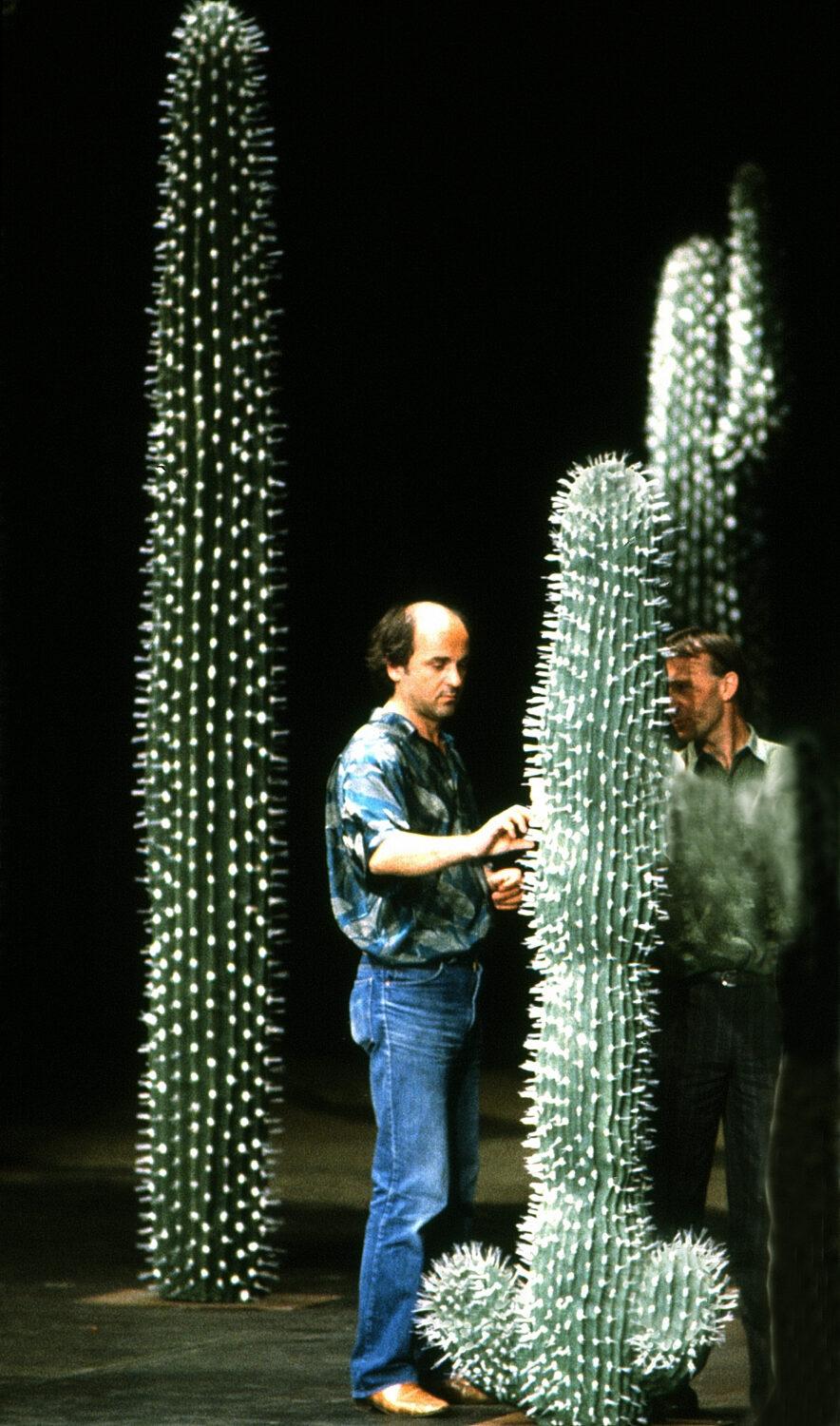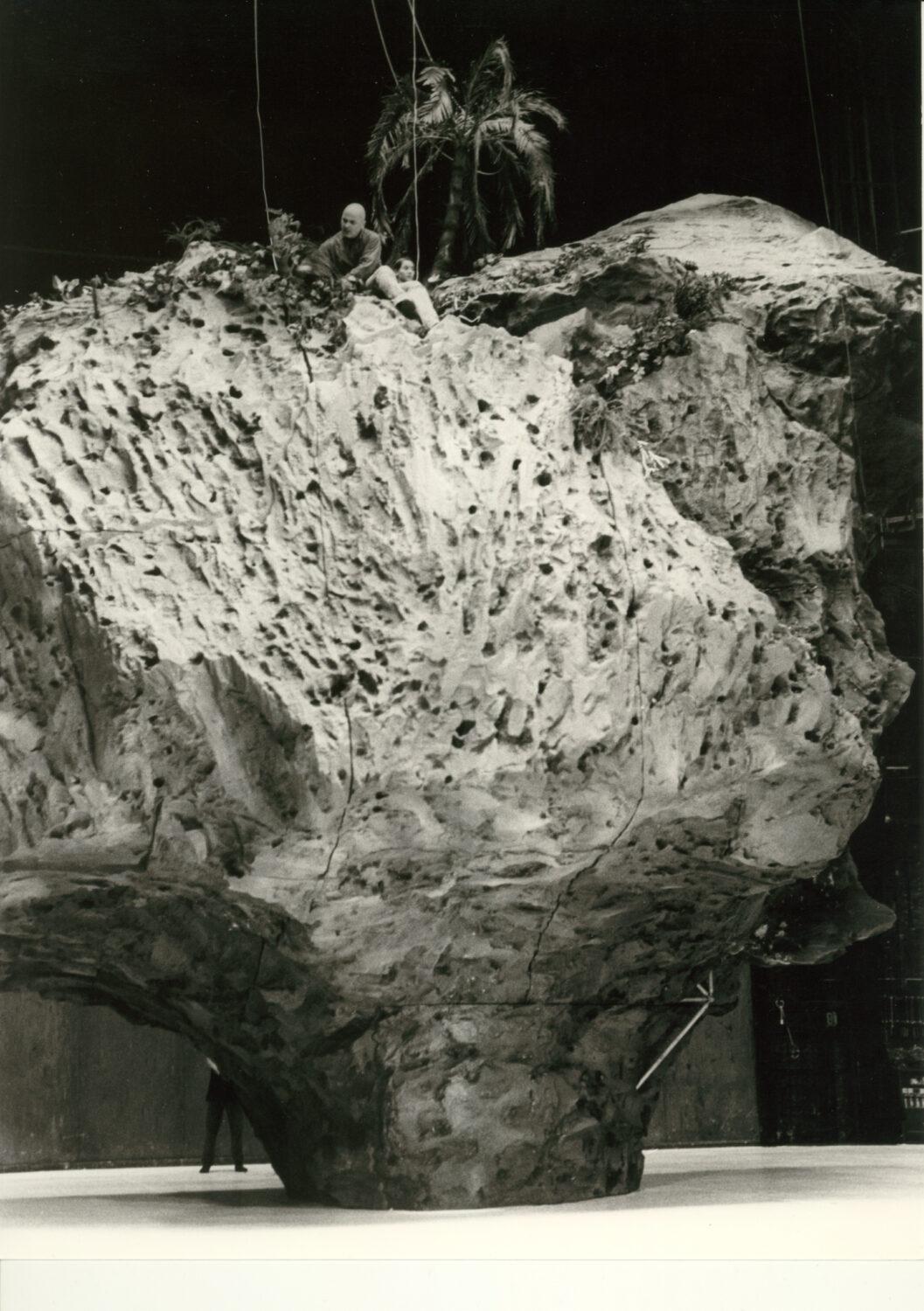Peter Pabst
In 1980 he designed his first set for a piece by Pina Bausch. This was the beginning of one of the longest cooperations in theatre history, an exceptionally close artistic and personal relationship, a symbiotic collaboration that lasted until the death of Pina Bausch in 2009.
Information
| 1944 | born in Grätz |
| 1969 to 1973 | studies costume and stage design with Max Bignens at the Cologne Werkschulen |
| 1973 to 1979 | works as a set designer at the Bochum theatre, mainly for Peter Zadek and Augusto Fernandes |
| Since 1979 | works as a freelance set and costume designer for over 100 theatre, dance theatre, opera, film and television productions in almost all major European cities and in America and Asia |
| 1980 to 2009 | designs and realises 26 stage sets for Pina Bausch, including the opera Bluebeard's Castle at the Festival d'Aix en Provence |
| 1991 | awarded the Josef Kainz Medal of the city of Vienna |
| 1992 | Award of the title "Chevalier des Arts et des Lettres" |
| 2008 | Exhibition Räume-Träume (‘spaces – dreams’) at Kunstmuseum Bochum |
| 2010 | Publication PETER FOR PINA, a book about his 29 years of work for Pina Bausch and Tanztheater Wuppertal |
| 2010 | awarded the title ‘Professor’ by the minister-president of the state of North Rhine-Westphalia |
| 2014 | exhibitions Caution as a Precaution at Tony Cragg’s Waldfrieden Sculpture Park in Wuppertal and So schön wie möglich (‘as beautiful as possible’) in the Wuppertal theatre workshops |
| 2014 | honoured with the prestigious Von Der Heydt Kulturpreis from the city of Wuppertal |
| 2019 | WHITE RED PINK GREEN exhibition at the museum Picnic in Seoul (South Korea) |
Biography
Peter Pabst was born in 1944 in Grätz and spent his early years in East Berlin. The family moved to Frankfurt am Main in 1954. Before finishing highschool, he began an apprenticeship as a dressmaker in Frankfurt and discovered the world of haute couture while working with Elise Topell in Wiesbaden. When he had the opportunity to work as an assistant to director of costume Kurt Palm in Bayreuth, costume design became his new interest. From 1969 he studied costume and stage design at the Cologne Werkschulen under the Swiss Max Bignens, who advised him to apply to Peter Zadek in Bochum. The encounter between the two established a lifelong friendship and working relationship. From 1973 to 1979 he was a permanent member of the Bochum theatre staff.
Peter Pabst is used to crossing boundaries. Since 1979 he has been working as a freelance set and costume designer in theatre, opera, dance, film and television, and up to now has created and realised stage sets and costumes for more than 100 theatre and film productions. His work has taken him to almost every major European city, as well as America and Asia, and he has collaborated with Luc Bondy, Klaus Maria Brandauer, Robert Carsen, Chen Shi-Zheng, Tankred Dorst, Jürgen Flimm, Udo Lindenberg, Johannes Schaaf, Andrei Serban, Istvan Szabo and Wim Wenders, among others.
Meeting Pina Bausch
The addition of a further genre, dance, seemed at first simply an optional extra. Pabst had already met Pina Bausch and her set and costume designer Rolf Borzik in Bochum in 1977. After Borzik's death, Pina Bausch invited Pabst to come to Wuppertal and asked him, whether he would consider designing the set for her new piece, later titled 1980. What an adventure! Peter Pabst was uncertain and had his doubts, but he accepted. The result was one of the longest collaborations in theatre history.
Spaces for Tanztheater
Like Pina Bausch in her pieces, Peter Pabst avoids explicit statements. This is the only way to leave room for the audience and their own imagination. The spaces are sensual, concrete and poetic at the same time. The materiality of these spaces is what makes them tangible and experienceable to the audience. And again and again they change the performers, their clothes becoming wet and revealing their bodies, their actions forced to accommodate the hindrances of water, earth, salt and stone. This lends a whole new authenticity to the actions. What we see – their exhaustion from the encounter with the materials, as well as the risk – is real, not stated.
Peter Pabst has been designing and realising spaces for the Tanztheater Wuppertal for over 29 years. Together with Pina Bausch, he has repeatedly embarked on voyages of discoveries with uncertain outcomes. The results are spaces ranging from Zen-like austerity to exuberant opulence.
Peter Pabst was awarded the Josef Kainz Medal by the City of Vienna in 1991 and holds the title of Chevalier des Arts et des Lettres since 1992. In 2010 he was granted the title of "Professor" by the Minister President of North Rhine-Westphalia, and in 2014 he was awarded the prestigious Von der Heydt Kulturpreis by the city of Wuppertal.
Gallery
Piece creation
Set design video projections
Set design
Set design
Set design
Set design
Set design
Set design
Set design
Set design
Set design
Set design
Set design
Set and costume design
Set design
Set design
Set design and video projections
Set design and video projections
Set design
Set design video projections
Set design
Set design and video projections
Set design video projections
Set design and video projections
"When designin, you can't be held back by the first idea, you have to find the strength to remain open and to continue to explore."
Peter Pabst in Peter for Pina, 2014
Peter Pabst in seinem Büro in Wuppertal während der Vorbereitungen zu Rough Cut (2005).
Photo: Gerburg Stoffel



